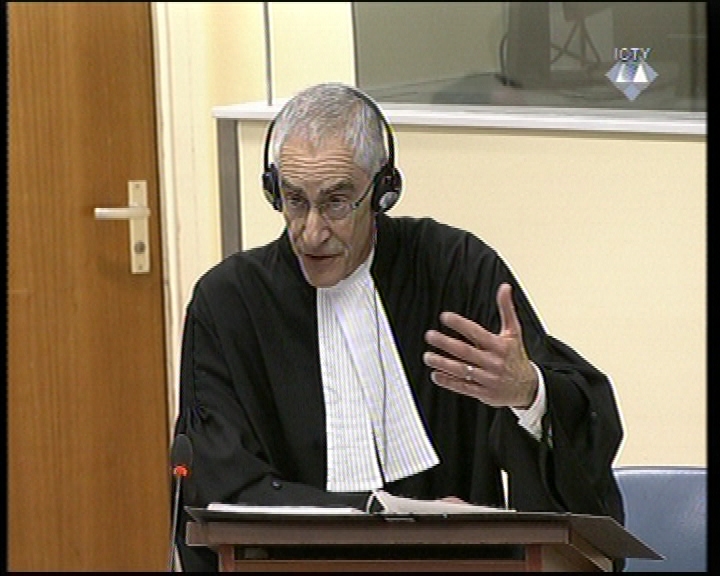Home
PROSECUTOR CALLS FOR LIFE SENTENCE FOR RATKO MLADIC
Concluding the prosecution’s closing argument at Ratko Mladic’s trial, prosecutor Alan Tieger noted that ‘any sentence but the gravest one foreseen by the law would be an insult to the victims and an affront to justice’
 Alan Tieger, Prosecutor
Alan Tieger, Prosecutor ‘The time has come for Ratko Mladić to be held accountable for each of his victims. Any sentence but the gravest one foreseen by the law and the Tribunal’s sentencing practice would be inadequate, an insult to the victims, those that had died and those that had survived. The only appropriate sentence is life imprisonment’.
Alan Tieger, the prosecution team leader, used these words to conclude the prosecution’s three-day closing argument at the trial of Ratko Mladic. The former commander of the VRS Main Staff was charged with genocide, war crimes and crimes against humanity committed during the war in BH.
Before Tieger’s conclusion, prosecution lawyers Adam Weber and Peter McCloskey again went through the evidence on Mladic’s responsibility for the artillery and sniper terror campaign against Sarajevo and the genocide in Srebrenica in July 1995.
According to Weber, the purpose of the artillery and sniper campaign in Sarajevo was to terrorize its citizens, to instil fear that the next shell or sniper bullet could hit them or their family. The prosecutor also recalled an intercepted radio communication of 28 May 1992, in which Mladic ordered his subordinates to shell Sarajevo, especially those parts where there ‘aren’t many Serbs’ in order to ‘drive them out of their minds’. Mladic’s message was ‘quite simple: when the Sarajevo-Romanija Corps cannons opened fire, Mladic was the one pulling the trigger’, prosecutor Weber noted.
The prosecutor also showed that the defence’s claims that Bosniaks were shelling their own people were based on ‘groundless speculations’, ‘non-existent evidence’ and ‘false interpretations’ of statements of some witnesses or UN officials. The defence based its claim on the implausible and contradictory statements by its expert witnesses. To illustrate the point, the prosecutor referred to Zorica Subotic’s report and testimony. Subotic was the defence’s ballistic expert. She first argued that the notorious bread queue massacre in Vase Miskina Street had been caused by a planted shell, only to change her story later, stating that the massacre had in fact been caused by mortar shell launched from an area so close to the target that it hit the ground almost at a right angle. As Weber put it, that would mean that the BH Army soldiers had fired a shell right up in the air and it then landed on their heads.
Skimming through the evidence on the Srebrenica crimes committed in July 1995, prosecutor McCloskey focused in particular on the well-known footage in which Mladic clearly showed his ‘genocidal’ intent. In the first recording taken on 11 July 1995 Mladic announced in the deserted Srebrenica that ‘it is time for us to have our vengeance against the Turks’. In the other clip, taken in the Fontana Hotel in Bratunac, Mladicconfronted the unwilling representatives of the Srebrenica refugees with a choice to ‘survive or disappear’. Bearing in mind what Mladic and his troops accomplished in the days that followed, McCloskey noted, ‘those words were to be taken dead seriously’. The prosecutor added that the man representing the refugees was Ibro Nuhanovic. After the meeting Nuhanovic remained in Potocari with his son Muhamed and wife Nasiha. They were all killed and their remains were later recovered as the prosecution noted in its final brief.
The prosecutor described in detail Mladic’s movements and actions from the moment he entered Srebrenica on 14 July 1995 to his departure for Belgrade in the evening of 14 July 1995. McCloskey alleged that Mladic ‘continued issuing commands to the Republika Srpska Army’ from Belgrade. Also, the prosecutor added, even if he ‘had been in coma, he would have still been criminally responsible’ for what was planned and implemented after the fall of Srebrenica.
Mladic remained in the centre of the events during the entire killing operation, McCloskey said. The accused was seen among the mass of prisoners, his key officers held command posts, all the communication and all the intelligence was streamed to Mladic. According to the prosecutor, it would be ‘unthinkable to claim, as the defence did, that Mladic didn’t know anything about the events and that he was not involved in them’.. On the contrary, McCloskey concluded, ‘Mladic is indeed a criminal, but he is not a fool’.
The defence will start its closing arguments on Friday, 9 December 2016.
Linked Reports
- Case : Mladic
- 2016-12-06 FROM ETHNIC CLEANSING TO GENOCIDE
- 2016-12-05 PROSECUTOR: MLADIC KEY PERSON ON ‘ROAD TO HELL’
- 2016-10-28 MLADIC'S DEMAND FOR JUDGES' DISQUALIFICATION REJECTED
- 2016-12-09 MLADIC’S DEFENSE: PROSECUTION FAILED TO MEET BURDEN OF PROOF
- 2016-12-12 A SEARCH OF A BETTER LIFE, NOT GENOCIDE
- 2016-12-13 DEFENSE: ACQUIT MLADIC OR SENTENCE HIM TO NO MORE THAN 5 TO 15 YEARS IN PRISON
